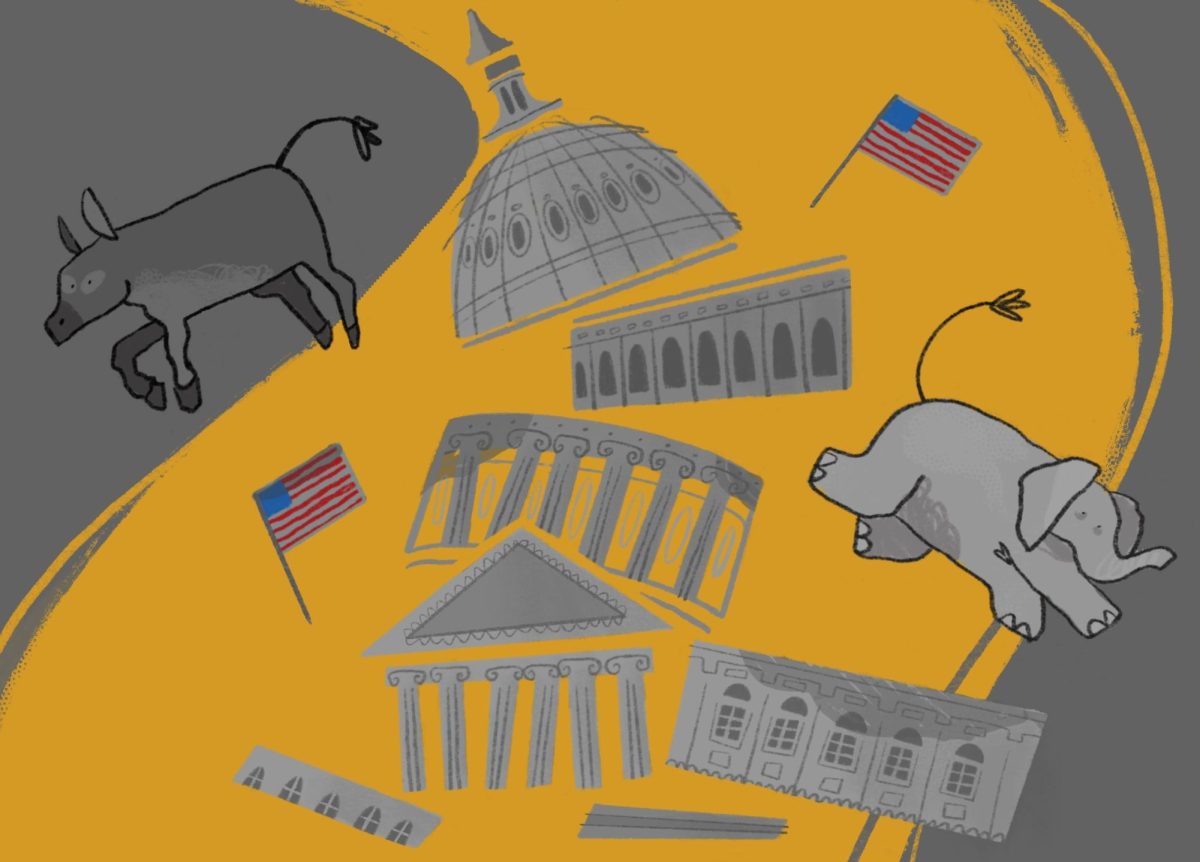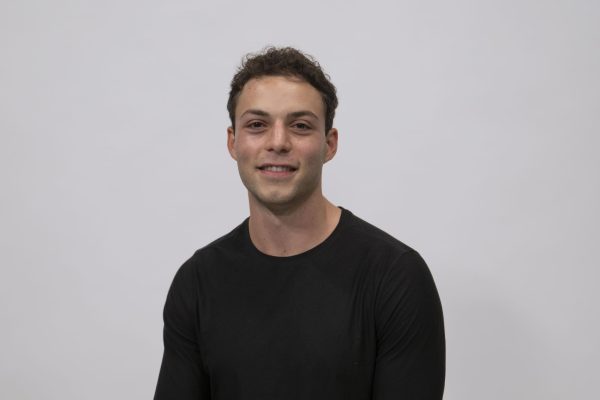In W.B. Yeats’ “The Second Coming,” the 20th-century poet describes a world “slouching towards Bethlehem,” symbolizing a descent into upheaval and uncertainty.
In this interview of our series “Slouching Towards,” contributor Jack Masliah speaks with Northeastern School of Law professor Jeremy Paul to better understand the magnitude of President Donald Trump’s attacks on the Constitution.
Paul teaches constitutional law, property law and jurisprudence and served as dean of the Northeastern University School of Law from 2012 until 2018. He recently participated in the Northeastern Reflects Civility Series as a panelist.
As a faculty member, Paul does not speak for university leadership, and all opinions expressed throughout this interview are solely his personal views.
This interview has been edited for length and clarity.
Masliah: I get the sense, while speaking to fellow students, that many have not yet grasped how close we are to crossing the Rubicon (the point of no return) — to a Constitutional crisis or to Trump defying a Supreme Court order. As a constitutional law professor, how would you describe to them the moment we currently find ourselves in?
Paul: I discourage people from framing the question the way you did, as a sort of “crossing the Rubicon” or a “is there a crisis” question because I think it is too reassuring.
Right now, we are already in a constitutional mess — and whether you want to call it a crisis or a pickle, or some other description — it is terrifying to have a president who is so willing to break the law and [to have] a Congress, and a large [part] of the country, who just doesn’t care.
The president, many members of Congress and Elon Musk — who is acting as a very high-level government official, even though he’s not legally appointed to be one — have a set of quite radical policy objectives, and they are much more concerned about achieving those objectives than they are about following the law. That puts the whole country in a very unsettled state.
When I say that [the Trump administration] doesn’t believe in the law, you don’t need to take my word for it. Over the last few weeks, there have been many cases brought against the Trump administration [in which judges rule] that, “Hey, what you did here, [it] is illegal.”
[The Trump administration is] not stupid. Given how many cases they’ve lost, they have to know in advance that a lot of things they’re doing are illegal — and they’re doing them anyway.
To the extent that their policy objectives are consistent with what the president’s campaign was … We have to give some deference to them because they did win the election.
But when it comes to breaking the law, there should be no deference to any president who breaks the law, and our president is doing so in a variety of ways.
He is trying to subvert the constitutional structure that gives Congress power over spending. He is refusing to spend money that Congress has appropriated. He is trying to take unilateral control over personnel in independent agencies despite the fact that Congress has passed statutes that says he can’t fire these people without cause.
He has pardoned obvious lawbreakers from the Jan. 6 insurrection. He has targeted political opponents, universities and law firms by withholding funds, by revoking security clearances, by taking away security details from people whose lives are at risk. There’s a lot of lawbreaking.
Masliah: If and when Trump defies a Supreme Court order, will it be something that we recognize?
Paul: If the Trump administration openly violates a Supreme Court decision, that will be terrible, and it will certainly be recognizable to everyone.
Things are terrible, but they can get worse. When you describe it as, you know, “Have we [crossed the line] or have we not?” I think that really takes away from where the focus should be.
I would put it very starkly [when] speaking to undergraduates students: I think President Trump, JD Vance and Elon Musk are trying to steal your future and are trying to transform the country into one that’s very different from the one that I inherited, that my parents inherited and the one we would have hoped to leave to you.
What we want from our leaders is [that] they think about how people will react [to their policies], worrying about elections and about what’s good for the country. And I don’t think that the current administration is thinking about those things enough.
Masliah: It does look like there’s a lot of preemptive submission going on here. We see it with the Paul Weiss case. We saw it very early on [following the election] with media companies. And we see it, dare I say, with our university as well. I would categorize these responses not only as spineless but dangerous. They only embolden Trump.
Is there any other way to see it? What do you think [universities are] thinking here when they’re making the decision to bend the knee?
Paul: There’s a concept which has been picked up in the press from the work of Timothy Snyder, who writes about authoritarianism. He calls it anticipatory obedience. And there is a lot of that.
That fits that category of, “We’re worried about something that might be done to us, so we’re going to show deference in advance so that we’ll be spared.”
Without reference to any particular example, I think that strategy is doomed to failure. When you’re showing deference in one way, a person who’s a bully is just going to keep putting the screws to you. You’re going to have to stand up, and you might as well stand up early rather than late.
Masliah: What do you think is the role of our law school, of law students and of law professors like yourself at a time like this?
Paul: I think the most important role of any law school and any professor is to speak the truth and keep speaking the truth, no matter what.
I do think it’s important for the law schools to keep speaking the truth, telling people all the things I’m telling you about how dangerous what’s happening is.
You know, you asked about a constitutional crisis and crossing the Rubicon, and it’s easy to think about this in abstract terms, right? There’s a law, and he’s breaking it. But the more important way to think about it is [that] there are people who are getting hurt.
There are people who are being detained unlawfully. There are people who are being pulled out of their apartments in the middle of the night. There are people whose health care treatments are being cut off, there are workers who are being fired for no reason, there’s research that’s being cut off that would [have] ultimately saved lives.
So the real role is to protect those who are being hurt.
Masliah: And what should be our role? The role of Northeastern students who might be confused, shocked and who find this moment dangerous but are kind of unsure what to do about it?
Paul: Well, I think what you’re doing is great, trying to find a vehicle through which to get the truth out. One of the things that has been clearly demonstrated about the last election is that among people who are paying a lot of attention to the news, Vice President Harris would have won if those were the people who voted.
So I think students have a real obligation, first of all, to follow the facts. Don’t listen to any one particular person. Don’t believe what you read on Reddit or what you see on TikTok, but really go get primary documents and really find out what is happening, and then organize your friends.
If you see things you don’t like, go to protests, write to your elected representatives. There are going to be a lot of decisions made by the courts in the next several months and years, and although our ideal image of courts is that they look at the written law and seek to apply it, there’s a lot of ambiguity in written law. And courts, for better or worse, are influenced by public opinion.
So, try to get everyone from all walks of life to understand what’s going on. Explain the risks and educate yourselves. That’s just absolutely crucial.
Jack Masliah is a fourth-year political science and philosophy major. He can be reached at masliahlitchi.j@northeastern.edu












